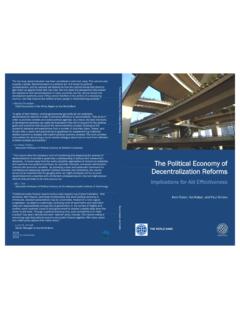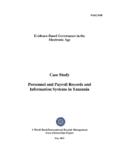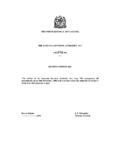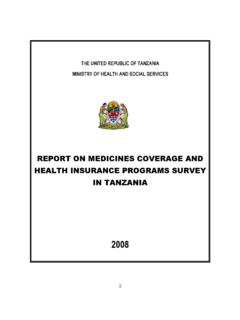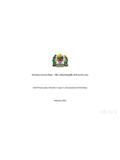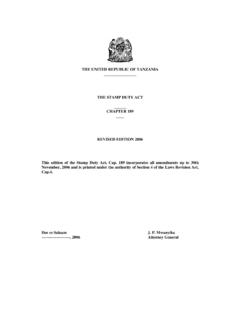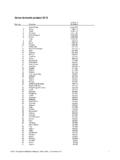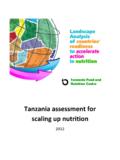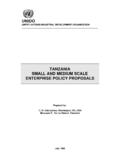Transcription of TRADE FINANCE ROLES OF BANKS - World Bank
1 TRADE FINANCE . ROLES OF BANKS . Prepared by Goodluck Nkini Manager TRADE FINANCE CRDB bank Limited. March 2005. Definition: TRADE financing is the provision of any form of financing that enables a trading activity to take place and which may be made directly to the supplier, to facilitate procurement of items for immediate sale and/or for storage for future activities,or it could be provided to the buyer, to enable him meet contract obligations. Importance of TRADE FINANCE The availability of TRADE FINANCE , particularly in developing and least-developed countries, plays a crucial role in facilitating international TRADE . Exporters with limited access to working capital often require financing to process or manufacture products before receiving payments. Conversely, importers often need credit to buy raw materials, goods and equipment from overseas.
2 The Role played by a Commercial bank Provide Information to buyers and sellers (advisory role). Settlements for TRADE Transactions Provide Financing Manage currency risks Take market risks Settlements for TRADE Transactions Open Account Advance Payments Documentary Collections Letters of Credit Provide Financing Working capital loans or overdraft, term loans. Issuing bank Guarantees Issuance of Letters of credit (L/Cs). Accepting and Confirming Letters of Credit Discounting Export documents Structured FINANCE Manage Currency risks BANKS are capable of minimizing Exchange rate fluctuation risk between major traded currencies through a hedging operation by taking a reverse position in the forward market or using options (to buy or to sell) foreign exchange in the futures market, thereafter be able to provide importers and exporters with competitive rates for : Spot Markets Forward Markets Options Swap Etc.
3 Take Market risks One risk caused by forces of demand and supply is related to price volatility. BANKS are capable of selling price hedging options to exporters to guarantee price in the future. Here we are emphasizing commodity options because while commodities are believed to be price volatile by nature, they account for more than 75% of exports from Tanzania. Financial Impediments for Import and Exports Financing problems: Lack of Security/Collaterals bank and Financial institutions act requires lending to the limit of 25%, 10% and 5% of the lending bank 's or financial institutions core capital if its fully secured, partly secured or unsecured respectively. BANKS perceive high risks associated with small scale lending, because of high costs of administering such loans and difficulty of enforcing contracts, partly due to cultural behavior of not re-paying loans and as the result of an inadequate legal framework and inefficient court system Financial Impediments for Import and Exports Financing problems: Absence of counter party financing alternatives outside the banking system Promissory notes, Bill of Exchange, Counter TRADE , Forfeiting, Suppliers credit etc.
4 High costs of borrowing to compensate BANKS for credit risks (Interest rates, application fee, facility fee). Regulatory issues Difficulties for importers and BANKS to comply with Foreign currency externalization documentation requirement. Other Impediments for Import and Exports Compliance to terms of TRADE Documentations Absence of reliable Market information about Counter party risks and trading requirements. Missing link to buyers and sellers (Financial institutions link). Infrastructure gap Transportation, Storage, Clearing & forwarding. Price Volatility for export especially commodities Absence of Quality verification leading to quality risk Financial Impediments for Import and Exports Countries belonging to different trading blocks especially neighboring countries leading to restricted trading between traders of the countries in different block Tanzania is not a member of COMESA unlike its neighbors such Burundi, Rwanda, Zambia etc.
5 Unfavorable terms in international TRADE Overseas supplier insist on Advance payments, while Exporters are forced to accept Open account terms While overseas suppliers require L/C's confirmed by first class bank , few of the L/C's in favour of suppliers in Tanzania will request for confirmation. Even bank charges are not shared equally TERMS BUYER SELLER. OPEN. ACCOUNT. ADVANCE. PAYMENTS. What should be done Policy issues Create advantage for wholesale lending Today it's a regulatory requirement that unsecured loans to a single borrower may not exceed 5% of a licensed bank 's capital, with the general perception that acceptable collateral is limited to cash or near cash securities. This ceiling is likely to have an adverse impact on the wholesale lending by licensed BANKS , including regional BANKS , to microfinance NGOs or SACCOs. If lending to small scale operators can be increased by use of these micro institutions, the applicable ratio need to be reviewed to encourage more lending by BANKS to microfinance NGOs or SACCOs.
6 What should be done Policy issues Foreign currency externalization documentation requirements is still posing ambiguity. BOT should come with written procedures as to how deferrals can be organized by BANKS to allow payments in advance for imports. It should be made clear what alternative documents are required in the absence of Air waybill or Bill of lading to evidence movement of goods or service into the country. If necessary a law should be enacted to allow importers to sign indemnity with BANKS that they will furnish TRADE documents upon completion of importation What should be done Role of Government To easy Collateral problems Government in collaboration with Central bank may consider introduction of guarantee schemes for long terms lending to SME, the like of existing for Export promotion guarantee. With support of World bank and donor agents establish a line of credit for BANKS supporting SME.
7 To facilitate imports use of ExIm bank of USA. to facilitate importation of refurbished cotton ginneries. Set legal framework and guidance for operation of Collateral Managers to raise confidence of BANKS in using stored commodities as collateral. To easy What should beproblems Collateral done ROLES of BANKS BANKS should take leading role in pursuing their customers to use structured FINANCE to secure pre- export and post-export financing. These may include Confirmed LC, Red clause LC, Bills Avalisation, BANKS should consider leasing to SME. BANKS should not be limited to traditional collaterals, but be innovative as to how other assets in the hands of small traders can be used to secure loans. households etc. One bank can be sponsored by World bank or other donor agent to run pilot program. More efforts are needed to sell price hedging What should be done BANKS , WB, BET, SME, and others Clientele ) Bring the clientele closer to the financial system through grassroots training efforts, building community associations and institutions, and organizing potential participants in the financial system small traders and SME's in groups that can support improved access to markets and FINANCE .
8 Organize seminars and workshops to expose all players to best practice techniques for managing risk, reducing cost, increasing revenue and loan repayment. Form networks of SME's in different specialties, to advocate for supportive policies and share learning experiences and trading practices End of Presentation &.








